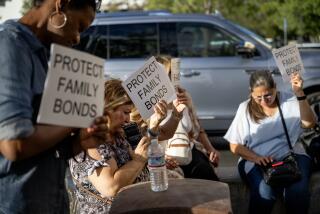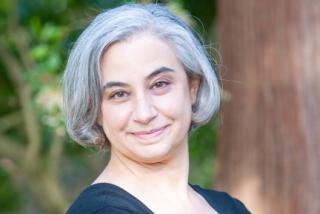‘90s FAMILY : Adoption Gives New Meaning to Families
- Share via
From the spectacle of the Baby Jessica-Anna Schmidt fight to the adoptions that peacefully take place every day, adoption today is doing more than forming families.
What used to be a secretive affair is forcing Americans to redefine the idea of family, says Judith S. Modell of Carnegie Mellon University in her book “Kinship With Strangers” (University of California Press, 1994).
Modell, an associate professor of anthropology and an adoptive parent, used anthropological fieldwork methods to study families who have adopted children, people who have been adopted and birth parents.
“What’s happened to adoptive families is that they have moved from a position in American society where they were barely identified, since adoption was kept a secret, to a position where they are at once very active in claiming their rights, and to some extent both heroic and villainous,” Modell says.
“They’ve become figures in the American imagination of people who are both noble and wonderful to take children, and quite the opposite at the same time--people who are selfish and greedy because they take children who belong to other people,” she says. “The adoptive family, as it becomes more public and active, also develops a much more polarized perception on the part of the public.
“That’s quite different from what was true years ago--the power of the image of the adoptive family is very, very strong compared to what it once was,” Modell says.
“I think that’s partly because it puzzles families who are not adoptive. What does it mean to really want a child badly--which is what the adoptive family represents? I think it’s an issue people don’t like to face about themselves. When it’s not easy (to have a baby), you have to face what that desire means, whether this is a selfish or altruistic desire.”
The move toward greater openness in adoption resulted from activism by three groups, Modell says.
Birth parents, with the formation in 1976 of the national group Concerned United Birthparents, began to fight their “invisible” status and demand information about children relinquished for adoption.
Complaints from adoptive parents about the process of obtaining a child from an agency--that the process was unfairly judgmental and arbitrary--brought changes beginning in the late 1970s, Modell says.
“Questionnaires and interviews gave way to group meetings and parent-training classes. . . . Becoming an adoptive parent was a matter of self-searching.” Others turned to private adoption.
Adopted children who wanted to find out more about their birth parents and background led to the search movement, which clearly has influenced adoption policy.
The demise of secrecy may be a relief. For adoptive families, though, it also adds to the difficulty of what is “already a very self-conscious parenthood,” Modell says.
“I think that’s probably to the good. It brings that all very forward, so that it’s not just a matter of having to answer questions of a social worker--it’s being able to address a wider public than that, so it becomes less scrutiny and more of a discussion of what it means to be a parent . . . and that is a positive thing.”
Because of evolving changes in the concept of kinship, Modell says, “people will not think of families as absolutely inevitable, but much more a matter of choice and fluidity. And when it’s a biological child, it’s going to be less thought of as ‘Well, this just happened,’ and it’s natural. It will be much more in terms of a positive choice, a relationship that has to be worked on, a relationship that is much more of a process than we would have thought. The understanding of the nature of the relationship with the child will change.”
More to Read
Sign up for Essential California
The most important California stories and recommendations in your inbox every morning.
You may occasionally receive promotional content from the Los Angeles Times.













